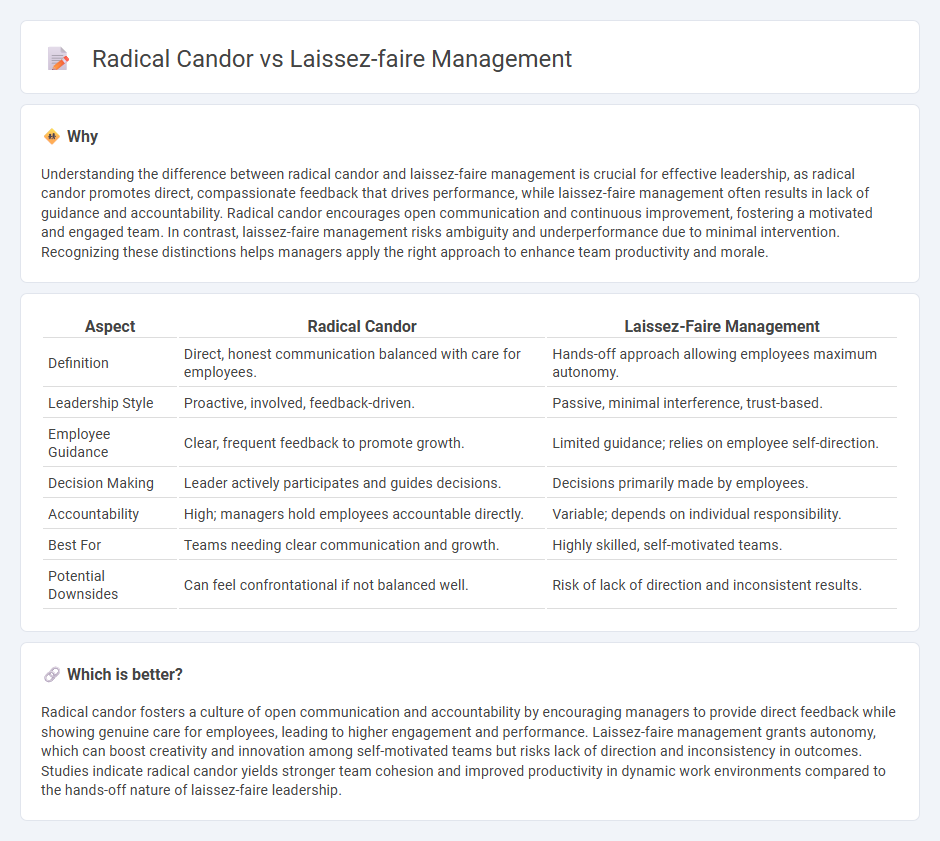
Radical candor fosters a culture of open communication and direct feedback, promoting employee growth and accountability, while laissez-faire management emphasizes autonomy and minimal intervention, often leading to varied team performance. Understanding the balance between these management styles is crucial for leaders aiming to maximize team efficiency and morale. Explore deeper insights to determine which approach suits your organizational needs best.
Why it is important
Understanding the difference between radical candor and laissez-faire management is crucial for effective leadership, as radical candor promotes direct, compassionate feedback that drives performance, while laissez-faire management often results in lack of guidance and accountability. Radical candor encourages open communication and continuous improvement, fostering a motivated and engaged team. In contrast, laissez-faire management risks ambiguity and underperformance due to minimal intervention. Recognizing these distinctions helps managers apply the right approach to enhance team productivity and morale.
Comparison Table
| Aspect | Radical Candor | Laissez-Faire Management |
|---|---|---|
| Definition | Direct, honest communication balanced with care for employees. | Hands-off approach allowing employees maximum autonomy. |
| Leadership Style | Proactive, involved, feedback-driven. | Passive, minimal interference, trust-based. |
| Employee Guidance | Clear, frequent feedback to promote growth. | Limited guidance; relies on employee self-direction. |
| Decision Making | Leader actively participates and guides decisions. | Decisions primarily made by employees. |
| Accountability | High; managers hold employees accountable directly. | Variable; depends on individual responsibility. |
| Best For | Teams needing clear communication and growth. | Highly skilled, self-motivated teams. |
| Potential Downsides | Can feel confrontational if not balanced well. | Risk of lack of direction and inconsistent results. |
Which is better?
Radical candor fosters a culture of open communication and accountability by encouraging managers to provide direct feedback while showing genuine care for employees, leading to higher engagement and performance. Laissez-faire management grants autonomy, which can boost creativity and innovation among self-motivated teams but risks lack of direction and inconsistency in outcomes. Studies indicate radical candor yields stronger team cohesion and improved productivity in dynamic work environments compared to the hands-off nature of laissez-faire leadership.
Connection
Radical candor and laissez-faire management both emphasize employee autonomy but differ in communication style and accountability. Radical candor combines direct, empathetic feedback with trust in employees' judgment, fostering personal growth and team cohesion. Laissez-faire management offers minimal supervision and hands-off leadership, which can lead to challenges in guidance without the proactive feedback characteristic of radical candor.
Key Terms
Autonomy
Laissez-faire management promotes autonomy by giving employees freedom to make decisions and manage their work independently, often leading to higher creativity but requiring strong self-motivation. Radical candor also values autonomy but balances it with direct, empathetic feedback to support growth and accountability within a collaborative environment. Explore how these leadership styles impact team dynamics and performance to determine which best suits your organization's culture.
Feedback
Laissez-faire management typically involves minimal intervention, allowing employees to self-manage but often resulting in limited feedback and unclear expectations. Radical Candor emphasizes direct, honest feedback combined with genuine care, fostering growth and a culture of continuous improvement. Explore how integrating Radical Candor can transform feedback practices and enhance team performance.
Accountability
Laissez-faire management often results in low accountability as leaders provide minimal guidance and expect employees to self-manage, which can lead to inconsistent performance. Radical candor emphasizes direct, honest communication combined with genuine care, fostering a culture where accountability is clear and constructive feedback drives improvement. Explore how adopting radical candor can transform your organization's accountability and performance.
Source and External Links
Understanding Laissez-Faire Leadership - This article explains that laissez-faire leadership is a management style where leaders provide minimal oversight and allow employees considerable autonomy in decision-making and task management.
What Is Laissez-Faire Leadership? - Indeed's article outlines the characteristics of laissez-faire leadership, including effective delegation, freedom in decision-making, and sufficient resources provided by leaders.
The Pros and Cons of Laissez-Faire Leadership - This article discusses the advantages and disadvantages of laissez-faire leadership, highlighting its impact on accountability, creativity, and employee satisfaction.
 dowidth.com
dowidth.com